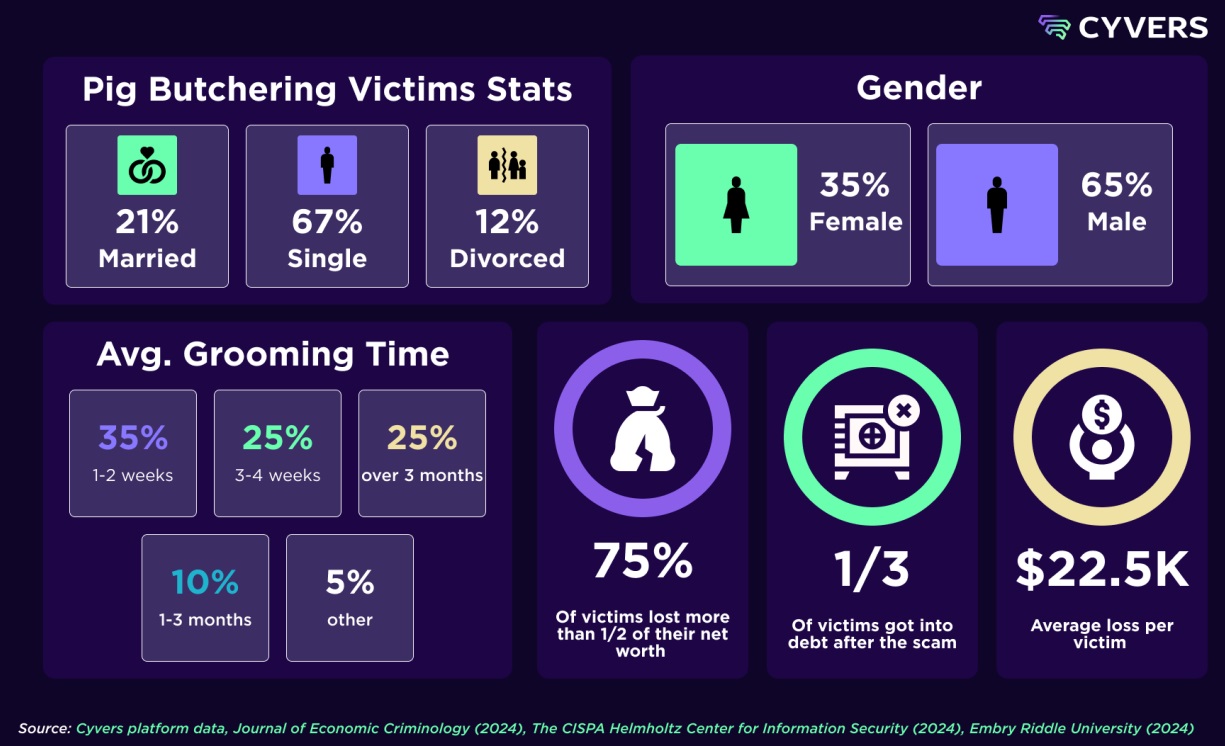Key Takeaways:
- In 2024, pig butchering scams led to $5.5B in crypto losses, exceeding hacks.
- These scams threaten retail investors and platforms the most.
- Investors require protection tactics, and combating scammers requires increased vigilance and global collaboration.
Once heralded as a symbol of innovation and financial liberation, the cryptocurrency world is becoming increasingly darker, as a cruel and intensifying menace infiltrates it: the pig butchering scam. A shocking report by on-chain security company Cyvers highlights the destruction brought about in 2024; Approximately $5.5 billion has been stolen from unsuspecting crypto investors on the Ethereum network alone — across more than 200,000 identified cases. This is more than a financial hit; it’s a confidence crisis and a security test, and a blazing alarm bell for the entire crypto community.
Cyvers has a report detailing the anatomy of these scams, illustrating both the scale and the sophisticated ways these criminals operate. The staggering magnitude of the $5.5 billion number reflects an important transition: pig butchering has moved beyond the standard cryptocurrency scams and is now the largest single threat to retail crypto investors and the exchanges on which they trade.
How to Understand the $5.5 Billion Black Hole? A Deep Dive into the Losses
To grasp the magnitude of this crisis, it’s essential to break down the $5.5 billion figure and understand its implications. This is clearly not just an aggregate figure or for that matter, a sum of cash lost, but a systemic undermining of trust and an open wound in the heart of the decentralized finance (DeFi) ecosystem.
This is a staggering amount compared to the losses caused by traditional crypto computer hacks and exploits. It speaks to the power of social engineering, the way in which scammers capitalize on human emotions and prey on weaknesses in order to gain access to investors’ wallets.
Why Is Pig Butchering So Terrifyingly Successful? The Art of Deception Unveiled
A pig butchering attack is effective not because of technical sophistication but due to psychological manipulation. Unlike the old-style hacks that take advantage of code bugs or gaps in systems, pig butchering is a bait-and-switch that breeds false trust and intimacy with the target. This “grooming” process is a hallmark of these scams and what differentiates them from other kinds of crypto-related fraud.
Michael Pearl, Cyvers VP of GTM Strategy brilliantly drives this point home: “It’s not about hacking a blockchain; it’s about hacking a human heart.” He continues, “This deliberate and calculated manipulation is what makes pig butchering so insidious and difficult to defend against.”

Pig butchering victim stats. Source: Cyvers
- The Power of Patience: Longer Grooming Periods: Scammers invest significant time in gaining their victims’ trust. According to Cyvers data, 35% of cases involved grooming periods of one to two weeks, while a concerning 10% lasted three months or longer.
- Emotionally Manipulating the Scammed Victim: The scammers, the masterminds behind these schemes, are highly skilled at identifying and exploiting their victims’ emotional vulnerabilities. They target loneliness, financial struggle and the search for connection, spinning elaborate stories that strike the chords of desire within the minds of their targets.
- “Fattening the Pig” — The Gruesome Metaphor: The name of the scam alone, “pig butchering,” reflects the gruesome process. Scammers wine and dine their mark, showering them with attention, compliments, even romance, all the while earning their confidence and trust — and then they bleed them dry.
The “Wrong Number” That Changes Everything: Imagine a single parent getting a message out of nowhere from a friendly stranger. Gradually, they message each other, share the highs and lows of their lives, and develop a bond. Soon, the conversation subtly pivots to investments and the stranger presents a supposedly no-risk crypto opportunity. Due to this real connection, the single parent, with a burning need for financial stability, will much more eagerly trust the stranger’s judgment and dismiss its natural risks.
The AI Infusion: Extending the Reach and Complexity of Pig Butchering
Artificial intelligence (AI) has been introduced into the world of pig butchering, and it represents the scale of sophistication which scammers fantasized to build in ways they could never have dreamed of. Unfortunately, AI is also being used to create highly convincing fake profiles, craft personalized messages, and realistically impersonate real people using deepfakes and voice cloning.
This worrying trend is transforming the realm of online fraud, creating a scenario in which victims struggle to separate fact from elaborate fabrications.
- The Art of Fabrication: AI-Generated Identities: Scammers now need only a few prompts to receive realistic-looking fake profiles on social media and dating apps, and can easily create profiles with AI-generated photos, biographies and social networks. This in itself makes it so much easier to gain credibility and draw potential victims into their net.
- The Chatbot Army: Automated Conversations at Scale: AI-powered chatbots can have natural conversations with endless victims in parallel, allowing human scammers to allocate their effort on the high-value targets and orchestrate the pivotal components of the con.
- Revolutionizing Deception: A tool for Trust and Authority Impersonation: The technology behind deepfakes empowers exploitation, as scammers can produce high-quality fake audio or video recordings, pretending to be trusted individuals like financial consultants and government officials, thus gaining even more credibility and control over victims.
More News: Phishing Scams Dominate Crypto in 2024: What We Learned About Security
The Ripple Effect: Impacts on Crypto Platforms Beyond Individual Victims
The Cyvers report correctly identifies increasing anxiety around crypto platforms, and centralized exchanges (CEXs) in particular, which are shouldering the bulk of this ongoing crisis. All of this is creating for these platforms a perfect storm of challenges:
- Eroded Trust Reputational Damage and Investors Flight: A surge in pig butchering scams causes reputational damage, leading to reduced user activity and declining investor interest.
- Regulatory Oversight: Regulatory bodies are ramping up their scrutiny of crypto platforms, seeking more transparency and accountability regarding the prevention of illicit activities, such as pig butchering scams.
- Banking Relationship Woes: Financial Instability: Financial institutions are becoming increasingly cautious about their relationships with crypto platforms, making it harder for these platforms to maintain stable banking partnerships.
Cyvers, co-founder & CEO Deddy Lavid stresses urgency: “Crypto platforms are hemorrhaging millions, grappling with reputational crisis, struggling to maintain banking relationships, and increasingly facing regulatory scrutiny. It’s time for decisive action to protect users and restore trust in the ecosystem.”
Intervention Needed: The Crypto Community Must Confront the Pig Butchering Epidemic
The Cyvers report has been an alarm bell for the whole crypto ecosystem. Fighting the pig butchering epidemic takes a multi-pronged approach that includes:
- Fortifying Defenses: Enhanced Security Measures on Crypto Platforms: Crypto platforms and developers should focus on building their security measures before writing a single line of code, and use strong detector systems such as AI-powered fraud detectors, etc.
- User Education Programs: Educating Investors on Crime: Investors need to be versed in what these pig butchering scams look like and how they can avoid becoming a victim. This incorporates instructive assets, caution sign to search for, and best practices for internet security.
- Collaborative Law Enforcement Approaches: Pig butchering scams are often international operations, making it necessary for law enforcement agencies in various countries to cooperate in investigating and prosecuting the criminals responsible for these scams. This demands concerted international collaboration, intelligence sharing, and the mobilization of elite cybercrime task forces.
- Adopting Innovation: Using AI to corral fraud detection and prevention: The crypto industry needs to use AI-powered fraud detection and prevention tools to keep pace with scammer tactics that are changing at lightning speed.
Conclusion: A $5.5 Billion Wake-Up Call
The Cyvers report is more than a series of numbers; it’s a wake-up call, a call to arms, and a striking reminder of the crippling effect of pig butchering scams on the crypto ecosystem. A $5.5 billion greenbacks loss in 2024 — calls for a whole and coordinated response from the industry, regulators, and law enforcement. Together, we can protect the future of cryptocurrency and those who wish to engage in its transformative potential by strengthening our defenses, powering investors and forging unified shields against this sinister threat. The time to act is now.
The post $5.5 Billion Stolen: Pig Butchering Scams Explode in Crypto, Cyvers Report Reveals appeared first on CryptoNinjas.

You can get bonuses upto $100 FREE BONUS when you:
💰 Install these recommended apps:
💲 SocialGood - 100% Crypto Back on Everyday Shopping
💲 xPortal - The DeFi For The Next Billion
💲 CryptoTab Browser - Lightweight, fast, and ready to mine!
💰 Register on these recommended exchanges:
🟡 Binance🟡 Bitfinex🟡 Bitmart🟡 Bittrex🟡 Bitget
🟡 CoinEx🟡 Crypto.com🟡 Gate.io🟡 Huobi🟡 Kucoin.

















Comments